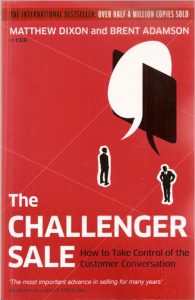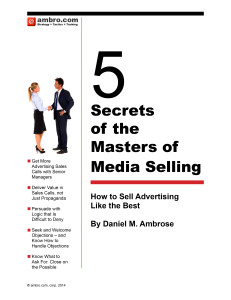The Challenger Sale
How to Take Control of the Customer Conversation
by Matthew Dixon and Brent Adamson
You don’t even have to understand the language to understand the TV commercials that sell bad breath, and a solution, whether it’s Tic Tacs or toothpaste. Whether in French, Spanish or English, the TV creative is the advertising version of Challenger Selling: Telling a customer about a problem they don’t know they have, before selling them the solution.
Opening a sales conversation with a challenge, a customer-problem that needs a solution, is an age-old sales tactic. Ziff-Davis perfected its own formula for starting the sales process with a challenge in its Structured Selling process: Show the customer their market share in backpacks or boots – for Backpacker Magazine – and challenge them about how they intend to protect their share or win new sales.
For 20 years now, dot.com entrepreneurs have sold their solutions, starting with a challenge we often didn’t know we had, or at least one we didn’t know could be solved; like the need to stay in touch with friends, or finding dates, or shopping for cars without talking to sales people. Digital entrepreneurs have told advertisers new versions of “you are wasting your money” in this way or that. It’s no wonder traditional media have suffered. While digital media have been selling fear of wasted spending, the traditional media have been selling “we’re really great.” Fear has been winning. Challenger selling!
 What is new in The Challenger Sale is that authors Matthew Dixon and Brent Adamson present research that statistically validates the effectiveness of being slightly disagreeable with a challenge, and that shows how to effectively bring value to the sales conversation that will engage influencers in organizations, not just the point-person in the sales process…the media buyer in our world of selling advertising-media.
What is new in The Challenger Sale is that authors Matthew Dixon and Brent Adamson present research that statistically validates the effectiveness of being slightly disagreeable with a challenge, and that shows how to effectively bring value to the sales conversation that will engage influencers in organizations, not just the point-person in the sales process…the media buyer in our world of selling advertising-media.
One of the perennial problems of ad-sales is that senior management, or owners of smaller enterprises, generally point to “the buyer” as the person a media sales person should talk to. But “the buyer” always wants to please their boss at the same time they insist they are the “decision maker.” The challenger sales process helps engage the customer-organization at higher levels and more holistically by bringing valuable information about the customers’ marketing challenges to the sales conversation. The Challenger Sale approach helps turn cold calls into smart calls. Smart calls turn your cold calls into an investment, not an expense.
I have never seen any statistically valid sales-effectiveness research done in the media business, in part because most of the sales forces are relatively small compared to 1000+ sales teams of big pharma or big tech. The national sales force for a big magazine might be only 20 people. Same for a television network.There may also be local sales forces for television, but there, too, it’s groups of small groups. The media business can learn from the general market. It is true that ad-media selling is different because of the presence of media buying agencies inserted between seller and source of the funds. But media sales have a lot in common with other complex selling situations where there is a key contact, but where the final decision on the purchase of an important product or service will be made by the consensus of a group.
Ambro.com has been teaching the 5 Secrets of the Masters sales training program for years. In it we discuss how the very best sales people get more appointments and get them with higher-level decision makers. One of the secrets is challenging them with “change.” When the prospect agrees that “things are changing” they also open themselves up psychologically to agreeing to changing their media buys. They can change – and buy from you or buy more from you – without admitting they were wrong in the past when they didn’t buy from your media company.
The Challenger Sale is powerful support for the ambro.com Strategic Sales Tactics training which covers the full process from appointment getting through persuasion, objection-handling, negotiations and closing.

